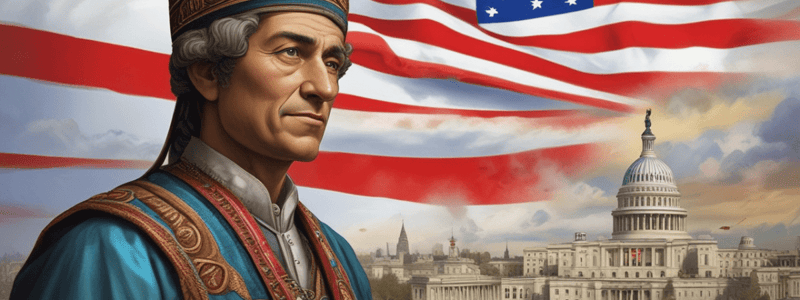Podcast
Questions and Answers
What is the main purpose of the principle of popular sovereignty?
What is the main purpose of the principle of popular sovereignty?
- To give more power to the government
- To add legitimacy to the United States government and prevent a tyrannical leader (correct)
- To reduce the role of citizens in the government
- To establish a monarchy in the United States
What is the primary function of the principle of limited government?
What is the primary function of the principle of limited government?
- To prevent government officials from being above the law (correct)
- To eliminate the role of the Constitution
- To allow the government to override citizens' rights
- To give absolute power to the President
What is the main purpose of the separation of powers principle?
What is the main purpose of the separation of powers principle?
- To prevent the concentration of power in one branch of government (correct)
- To abolish the Constitution
- To ensure equal power distribution among all branches
- To concentrate power in one branch of government
What is the primary goal of the system of checks and balances?
What is the primary goal of the system of checks and balances?
Why is the principle of federalism essential in the United States?
Why is the principle of federalism essential in the United States?
What is required for a treaty created by the president to go into effect?
What is required for a treaty created by the president to go into effect?
What can the U.S. Congress do if the president vetoes a bill?
What can the U.S. Congress do if the president vetoes a bill?
What is the main purpose of the system of checks and balances in the U.S. Government?
What is the main purpose of the system of checks and balances in the U.S. Government?
What is an example of a reserved power held by state governments?
What is an example of a reserved power held by state governments?
What is the term for the division of power between the federal and state governments?
What is the term for the division of power between the federal and state governments?
What is the primary purpose of the principles of government?
What is the primary purpose of the principles of government?
What is a key characteristic of a theocratic government's principles?
What is a key characteristic of a theocratic government's principles?
What is the outcome of a country's adherence to its principles of government?
What is the outcome of a country's adherence to its principles of government?
How do the principles of government influence a country's laws and way of life?
How do the principles of government influence a country's laws and way of life?
What is unique about the principles of government in different countries?
What is unique about the principles of government in different countries?
Flashcards are hidden until you start studying
Study Notes
Principles of Government
- The principles of government are the concepts and beliefs that guide how a government operates and the role of citizens in it.
- They determine how power is divided, a nation's balance of power, laws, and a citizen's way of life.
- They allow a nation to have structure and operation with stability and order.
Guiding Principles of the U.S. Government
- The five primary guiding principles of the U.S. Government are:
- Popular Sovereignty
- Limited Government
- Separation of Powers
- Checks and Balances
- Federalism
- These principles are built on the characteristics of equality, democracy, and liberty.
Popular Sovereignty
- The people (or citizens) are the ultimate source of government power.
- The government only operates with the people's consent and authority.
- This principle adds legitimacy to the U.S. government and prevents a tyrannical leader from taking hold.
- Citizens can vote and remove an elected official from power if they are unhappy with their representation.
Limited Government
- Elected officials are not above the law and their powers are restricted and defined by the U.S. Constitution.
- This principle was especially important to the Founding Fathers due to the absolute power of King George III.
- The Constitution is critical to limited government, as it contains the powers given to the government.
Separation of Powers
- This principle divides power in the U.S. Government among the legislative, executive, and judicial branches.
- Each branch has its own distinct powers and no one branch is meant to be more powerful than another.
- This principle prevents a concentration of power in one branch of the government.
Checks and Balances
- This principle allows each branch to limit the power of another branch.
- Many powers of the U.S. government rely on two branches to be fulfilled, preventing one branch from becoming too powerful.
- Examples include the president's veto power and the Senate's ratification of treaties.
Federalism
- This principle is the division of power between the federal (national) government and the state governments.
- Reserved powers are kept for state governments, while delegated powers are given to the federal government.
- Concurrent powers are shared between the federal and state governments.
- Examples of reserved powers include issuing marriage licenses, while delegated powers include providing for national security.
Studying That Suits You
Use AI to generate personalized quizzes and flashcards to suit your learning preferences.




